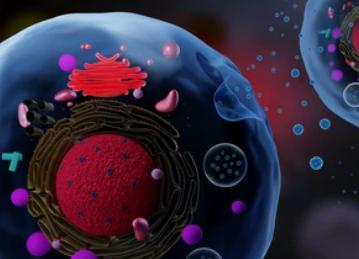Exosome Transfer Research
Online InquiryIntercellular communication is a common feature of most physiological interactions between cells in healthy organisms. In addition to direct cellular communication through intimate physiological contact, there are other communication mechanisms, such as through the influence of soluble mediators (e.g., cytokines, chemokines, and growth factors). Moreover, extracellular vesicles (EVs), including exosomes, are abundant in the intracellular space and represent another mechanism for intercellular information exchange. However, the current knowledge on exosome transfer (the secretion of exosomes and their internalization) between cells is still incomplete and needs further investigation. Creative Proteomics has built a robust and flexible platform that can provide you with exosome transfer analysis services to help accelerate the progress of your project.

Overview of exosome transfer
In addition to the molecules loaded in the exosomes, the intensity of intercellular exosome transfer is an important parameter for the subsequent regulation of the recipient cells. Current knowledge on exosome transfer is still incomplete. The intensity of exosome secretion is known to vary depending not only on the cell type but also on its physiological state. In addition, different combinations of transmembrane proteins on the surface of exosomes promote cell-extracellular matrix adhesion, thereby altering the affinity of receptor cells to capture exosomes. In particular, previous researchers have demonstrated that exosome transfer between cancer cells is associated with metastasis. Cancer cells have the potential to utilize exosomes in a manner that enhances their survival. In this process, the type of parental cell, the mechanism of exosome biogenesis and production, or the size and composition of the exosome appear less important.
Exosome transfer research
Creative Proteomics has focused on the interspecies transfer of exosomes. The platform of exosome transfer research is based on real-time fluorescence microscopy and single particle tracking (SPT) technology. We can isolate exosomes from the samples of clients, and then determine the internalization of exosomes between cells with real-time fluorescence microscopy. By using quantitative real-time PCR (RT-PCR) and immunoblot assay, we can further investigate the regulation of exosomal cargoes on receptor cells after the internalization of exocytosis. Our services can help researcher and professionals further to investigate in detail the endocytic pathway of exosome transfer among different cells or incorporating between cells of different species.

The technology platform for exosome transfer
- Quantitative RT-PCR
- Immunoblot assay
- Real-time fluorescence microscopy
- Single particle tracking (SPT)
The application potential of exosomes is enormous. They offer unparalleled diagnostic and therapeutic approaches to a wide range of major diseases, such as cancer, diabetes, heart disease, Alzheimer's disease, etc. However, these vesicles require further research. Creative Proteomics provides comprehensive and reliable services to clients worldwide by developing advanced platforms, improving analytical methods, conducting stability studies, and providing a thoughtful service experience, which leads to a competitive advantage in exosome research and applications. Learn more about how we are advancing basic exosome research through our portfolio of services.
* For Research Use Only. Not for use in diagnostic procedures.



